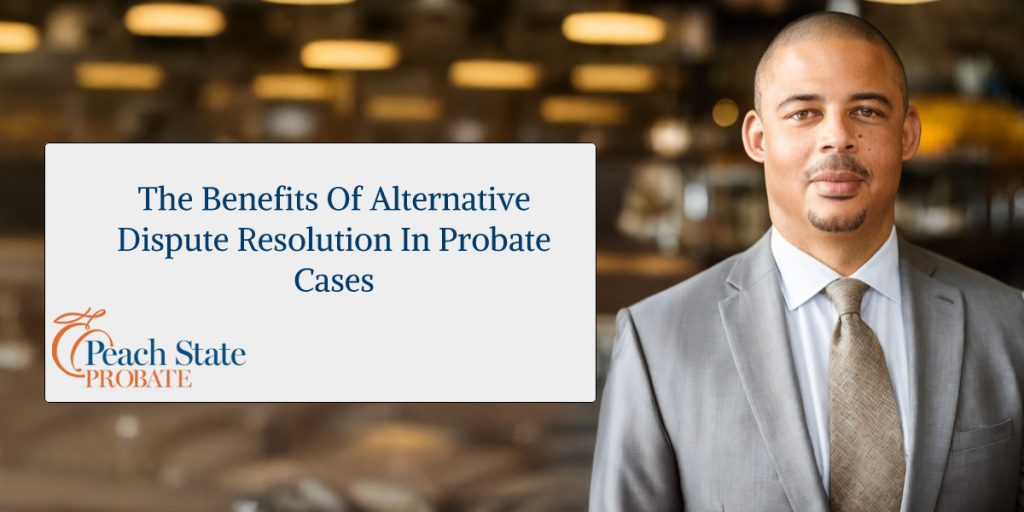## Understanding the Advantages of Alternative Dispute Resolution in Probate Matters
Alternative dispute resolution (ADR) has emerged as a favorable method for resolving disputes in probate cases. When family members or beneficiaries disagree on the terms of a will or trust, navigating through the traditional court system can be both lengthy and emotionally taxing. The benefits of adopting alternative dispute resolution strategies, including mediation and arbitration, can yield positive outcomes while minimizing disruption among family dynamics.
ADR provides a platform where parties can reach an agreement outside the formal court processes. In probate matters, this can be particularly beneficial as it allows families to maintain relationships while resolving their disputes. Rather than airing grievances in front of a judge, families can engage in controlled discussions tailored to their unique situations. This approach prioritizes collaboration, which can be especially important in preserving familial ties after the loss of a loved one.
Implementing ADR in probate disputes can decrease the burden on the court system. With an increasing number of cases, lawyers and mediators equipped with ADR techniques help expedite resolutions, effectively freeing up valuable judicial resources. The emphasis on confidentiality and privacy also sets ADR apart from traditional litigation, where sensitive family matters often become public.
## Defining Alternative Dispute Resolution
Alternative dispute resolution (ADR) encompasses various methods used to resolve conflicts without litigation. These methods primarily include mediation, arbitration, and conciliation. Mediation involves a neutral third party who facilitates communication between disputing parties, helping them to mutually reach a resolution. On the other hand, arbitration presents a more formal setting where an arbitrator makes a binding decision based on the evidence and arguments presented.
Although ADR is widely recognized as an effective resolution pathway, it is essential to note that these processes can each involve specific rules and structures. For instance, mediation tends to be less formal and focuses on creating a dialogue between the parties, while arbitration may resemble a court proceeding, with the arbitrator playing a role similar to that of a judge. Both methods, however, strive to resolve disputes effectively and amicably.
Particularly in probate cases, skilled mediators and arbitrators can guide the disputing parties toward what might be a mutually beneficial agreement, addressing complex emotions that often accompany inheritance disputes. The flexibility offered by ADR allows for tailored solutions that court judgments might not accommodate, reflecting individual family circumstances and needs.
## The Importance of Alternative Dispute Resolution in Probate Cases
The relevance of alternative dispute resolution in probate matters cannot be overstated. Probate disputes often arise during times of emotional difficulty, making it essential for resolutions to be handled delicately. Traditional litigation may only exacerbate tensions and leave lasting scars on family relationships, rather than healing rifts. In contrast, ADR fosters an environment of understanding and allows all parties to voice their concerns.
Moreover, ADR typically leads to faster resolutions compared to court-based processes. Probate litigation can take months or even years to fully resolve, while mediation sessions may yield agreements in much shorter time frames. This swift resolution not only minimizes emotional stress associated with protracted disputes but also reduces unnecessary legal fees that can drain estate assets, benefiting all stakeholders involved.
Increasing accessibility to ADR methods is particularly significant in probate cases within Georgia. The ability to resolve disputes efficiently and amicably can prevent litigation costs from crippling a family’s inheritance. As disputes can arise from matters of wills, trusts, and estate distributions, offering alternative paths for resolution can significantly empower families to reclaim control over these personal and sensitive matters.
## The Legal Framework Governing Alternative Dispute Resolution
The legal framework surrounding alternative dispute resolution in Georgia is structured to support its use in various legal contexts, including probate cases. ADR is often governed by both state and federal laws, which provide guidelines on how mediation and arbitration processes should be conducted. This framework aims to ensure fairness and compliance, enhancing the credibility of ADR as a legitimate dispute resolution method.
The Georgia Uniform Mediation Act outlines statutory protections for mediation participants, ensuring confidentiality and promoting open dialogue. This legal backing is vital, encouraging parties to participate in ADR processes without fear of their statements being used against them should the dispute revert to litigation. Such legislation helps create an environment where honest communication is prioritized, thereby facilitating resolutions.
Additionally, many probate court judges in Georgia advocate for ADR and may even require parties to consider mediation or arbitration before advancing to litigation. This proactive approach reflects a growing acknowledgment of the benefits of ADR in alleviating congested court schedules while ensuring that parties have an option to reach compromise before escalating matters to a formal court process.
## Real-World Examples of Alternative Dispute Resolution in Probate Disputes
The effectiveness of alternative dispute resolution can be observed through various real-world examples in probate cases. One notable case involved a family that contested a parent’s will, leading to discord among siblings. Instead of opting for costly litigation, the siblings decided to engage a mediator experienced in probate matters. The mediator facilitated a discussion about family values and heirlooms, ultimately leading to a resolution that respected the deceased’s wishes and acknowledged the feelings of all parties involved.
Another instance showcased how arbitration proved advantageous in a complex trust dispute involving multiple beneficiaries. The beneficiaries had differing interpretations of the trust language, which led to confusion and disagreements. By choosing arbitration, they allowed a qualified arbitrator to review the documentation and arbitrate a decision, which, although binding, avoided the long-drawn litigation process. This approach saved the beneficiaries time and money while ensuring that a neutral party rendered a decisive and expedient ruling.
These real-world examples not only highlight the practical advantages of ADR in probate disputes but also illustrate its potential to restore relationships and provide satisfactory resolutions. By prioritizing communication and flexibility, ADR can turn a challenging situation into a cooperative resolution, allowing families to move forward together despite their differences.
## Taking Steps Toward Alternative Dispute Resolution
When faced with potential probate disputes, individuals can take proactive steps to explore alternative dispute resolution options. The first step is to educate oneself about the various ADR methods available. Understanding the differences between mediation and arbitration allows individuals to make informed choices about which process aligns best with their particular circumstances.
In many cases, parties involved in a dispute can initiate ADR discussions independently, reaching out to each other to express their preference for a more amicable resolution. This approach can lead to a more collaborative environment, fostering a willingness to engage openly about concerns and negotiations. Formalizing the process may require enlisting the help of a mediator or arbitrator, who can offer structure and unbiased perspectives during discussions.
It is also advisable to set clear objectives and priorities before entering into any ADR process. Identifying what is most important for each party can guide negotiations, allowing them to explore creative solutions that fulfill everyone’s needs. By modeling a spirit of cooperation and focusing on mutual gains, participants are likely to experience a more satisfying resolution.
## Common Pitfalls in Alternative Dispute Resolution
While alternative dispute resolution offers many advantages, there are common mistakes that parties should strive to avoid. One prevalent pitfall is inadequate preparation. Parties who enter into mediation or arbitration without a clear understanding of their objectives or relevant information may waste time and resources. Thorough preparation involves gathering documentation, clarifying each party’s position, and establishing what outcomes would be deemed acceptable.
Another challenge lies in failing to communicate effectively during the ADR process. Open communication is critical in mediation, where a neutral facilitator allows for dialogue. When emotions run high, misunderstandings can quickly escalate, derailing potential resolutions. Parties ought to practice active listening and maintain a respectful tone to mitigate this risk, ensuring that all voices are heard and valued.
Lastly, it is essential to recognize the limits of ADR. While mediation and arbitration can lead to amicable resolutions, they may not be effective in every scenario, especially when one party is unwilling to engage honestly. In such cases, understanding when to shift back toward litigation is vital. Oversight in assessing the appropriateness of ADR may lead to unresolved issues that could require judicial intervention later on.
## Knowing When to Consult an Attorney
Consulting an attorney is crucial at various stages of the alternative dispute resolution process, especially in probate matters. While ADR offers opportunities for amicable resolution, understanding the legal implications of any decisions is essential. An attorney can provide valuable insights into the specific laws governing probate and the ADR processes offered in Georgia, ensuring that all parties are well-informed before proceeding.
One of the key moments to seek legal guidance is during the initial exploration of ADR options. An attorney can assist clients in evaluating whether mediation or arbitration aligns with their circumstances, helping them weigh the benefits and drawbacks in the context of their unique disputes. Additionally, they can help assess the potential outcomes of engaging in ADR versus litigation, providing clarity on which path may serve clients better.
Moreover, in cases where mediation or arbitration does not yield a resolution, an attorney’s support becomes indispensable. If negotiations break down, or if one party refuses to comply with agreed-upon terms, having legal representation can facilitate the transition into traditional litigation if necessary. An attorney can also craft any agreements reached during ADR into legally binding documents, ensuring that both parties are held accountable.
## Advantages of Legal Representation in Alternative Dispute Resolution
Legal representation plays a vital role in the success of alternative dispute resolution, particularly in probate disputes. Having a knowledgeable attorney present can provide clients with reassurance and clarity, guiding them through the complexities of mediation or arbitration. With a legal advocate at their side, parties can engage more confidently and effectively, voice their concerns, and advocate for their interests without feeling overwhelmed.
An attorney also helps identify key issues that may arise during the ADR process. They can assist in formulating strategies that target underlying interests rather than just positions, allowing parties to find common ground. Their experience enables them to anticipate potential challenges, creating a foundation for productive discussions. This proactive mindset positions clients more favorably for successful resolutions.
Additionally, legal representation ensures that any agreements reached during ADR are sound and enforceable. An attorney can draft settlement agreements that comprehensively address the nuances of the dispute, reducing the risk of ambiguity or future misinterpretation. By safeguarding their clients’ interests, legal representation brings an additional layer of professionalism and security to the alternative dispute resolution process.
## How Peach State Probate Facilitates Alternative Dispute Resolution
Peach State Probate is dedicated to providing families throughout Georgia with a compassionate and collaborative approach to alternative dispute resolution in probate cases. Understanding the emotional complexities involved, the team prioritizes an environment of cooperation while addressing concerns with expertise and understanding. By fostering open dialogue, clients can approach their disputes positively, recognizing the potential for resolution without escalating tensions.
The attorneys at Peach State Probate are equipped with extensive knowledge of both probate law and alternative dispute resolution methods. They guide clients in evaluating the most suitable options while ensuring adherence to legal standards in mediation and arbitration. Their tailored approach focuses on the unique dynamics of each family, providing individualized attention throughout the dispute resolution process.
By partnering with Peach State Probate, clients benefit from a wealth of resources and support that facilitate smooth alternative dispute resolution. From navigating the intricacies of negotiation to ensuring compliance with legal requirements, the firm’s commitment to excellence helps families find resolution. With a strong focus on nurturing relationships and restoring harmony, Peach State Probate serves as an ally in resolving disputes effectively and compassionately.
## Frequently Asked Questions about Alternative Dispute Resolution




